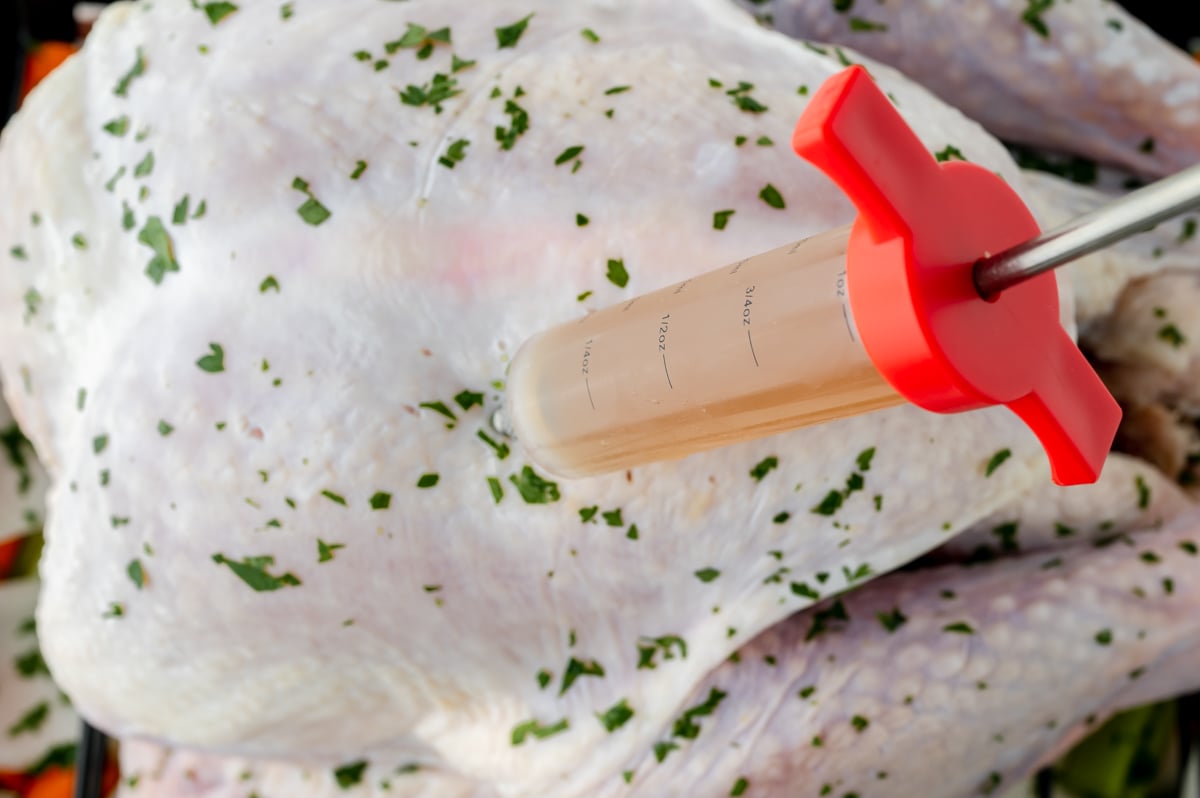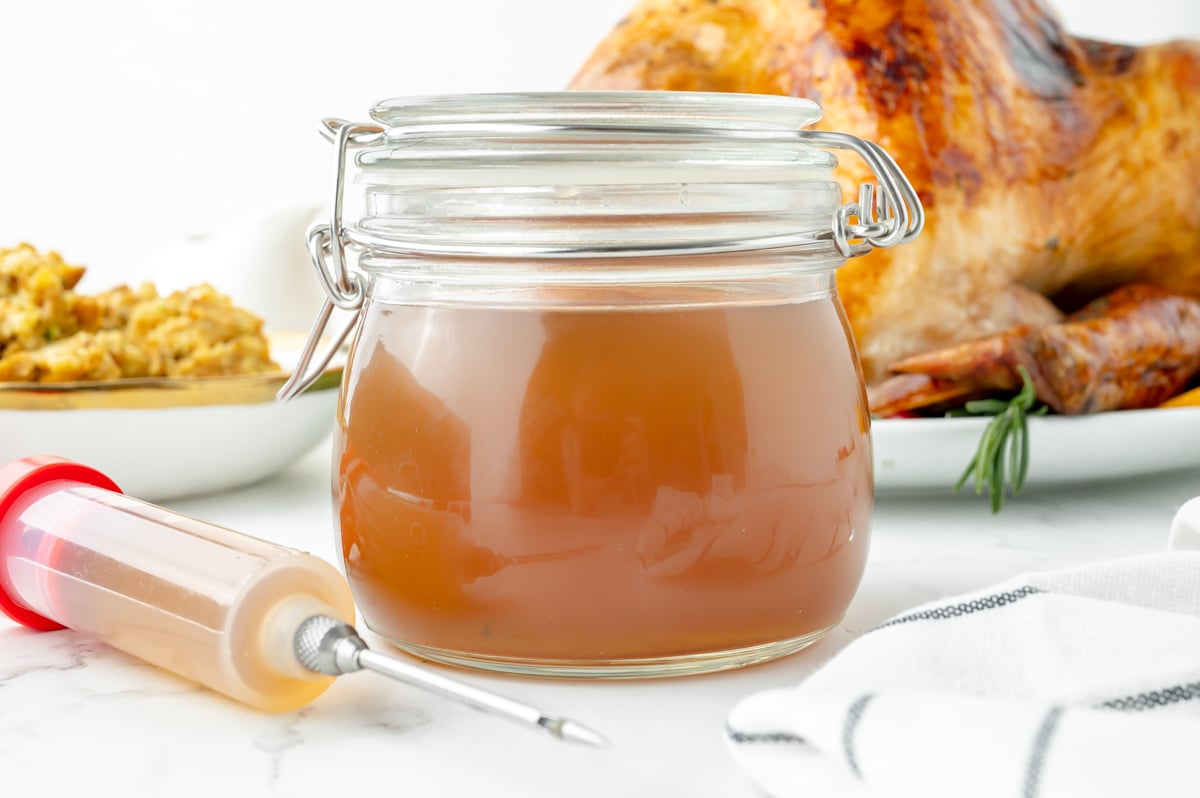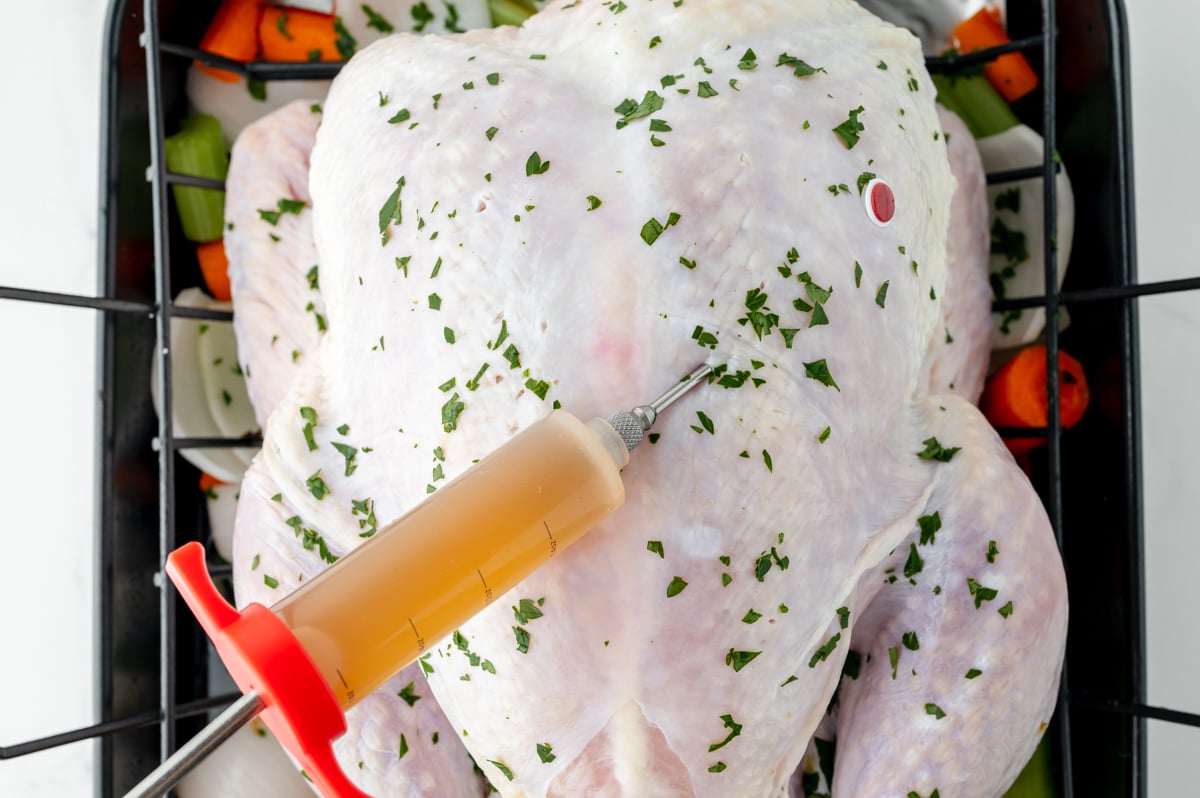Oh those Cajun turkey people are SMART! There you are trying to figure out what size turkey to buy and there is a pretty display promising you the BEST Thanksgiving turkey you’ve ever tasted with a bottle of turkey injection juice.
Injecting a turkey is a popular technique used by many cooks to impart extra flavor and moisture into the meat. The key question is can you inject the turkey the night before cooking or should you wait until right before roasting? There are advantages and disadvantages to both approaches. In this comprehensive guide we will cover everything you need to know about timing your turkey injection to get the most flavorful bird possible.
The Benefits of Injecting the Night Before
Injecting your turkey the night before offers some distinct advantages
-
Longer marinating time – Injecting 8-24 hours before roasting allows more time for the flavored marinade or broth to permeate deep into the meat. This can lead to more intensely flavored turkey.
-
Planning ahead – Getting the injection done in advance saves you time and hassle on the big cooking day when you likely have other dishes to prepare.
-
Food safety – Once injected, the turkey needs to be refrigerated. Doing this the night before gets this crucial chilling time done.
-
Convenience – No need to wake up extra early to factor in injection time on cooking day. It’s already done the night before.
Potential Drawbacks of Injecting Early
However, there are a few potential cons to keep in mind:
-
Overly salty turkey – The salt content in some injections can start breaking down proteins if left too long, leading to unpleasant texture.
-
Mushy texture – Similarly, the meat can become too soft or mushy if injected more than 24 hours before cooking.
-
Not as fresh – Injecting mere hours before roasting means everything is freshest and flavors don’t dull.
-
Safety – Turkey must remain refrigerated once injected. Any longer than 36 hours chilled runs contamination risks.
Best Practices for Night Before Injection
If you do choose to inject the night prior, follow these tips:
-
Use refrigerator overnight – Keep the injected turkey properly chilled below 40°F. Do not leave out on the counter.
-
Avoid heavy salt – Opt for low or no-salt injections to prevent overly salty meat.
-
Try butter or stock – Inject broth, wine, or flavored butter rather than heavy saline solutions.
-
Inject lightly – Don’t over-inject since flavors have more time to spread.
-
Cover turkey – Keep the injected bird covered in fridge to retain moisture.
-
Limit 1-2 days – Refrigerate no more than 24-36 hours pre-cooking for food safety and ideal texture.
Injecting Right Before Cooking
Injecting just 2-4 hours before roasting or smoking also has some advantages:
-
Fresher flavors – Everything is newest when injected closer to cook time.
-
Less risk of mushy texture – Gives less time for proteins to break down and get mushy.
-
Easy to control salt – You can adjust and add last-minute seasoning to taste.
-
Food safety – With a shorter chilling time needed, there’s less contamination risk.
-
Adaptable – You can tweak flavors based on what else you’re serving that meal.
Tips for Same-Day Injection
If injecting shortly before cooking, follow these pointers:
-
Prep injection early – Make injection mixture at least 2 hours before cooking to allow some marinating time.
-
Thaw if needed – Be sure turkey is fully thawed before injecting if using frozen.
-
Pat turkey dry – Dry surface allows injection to absorb better into meat.
-
Watch salt – Last-minute injection makes it easier to control salt amounts.
-
Inject evenly – Distribute injection liquid throughout turkey, especially in thick areas.
-
Refrigerate 2+ hours – Chill injected turkey at least a couple hours before roasting.
-
Cover turkey – Keep the just-injected bird covered in fridge to retain moisture.
The Takeaway on Turkey Injection Timing
The verdict on whether you can inject a turkey the night before largely comes down to personal preference. Both approaches have their merits. For intense flavors and advance planning, go for the night before injection. If you prefer absolute freshness and easier salt control, injecting just before works too.
Just be sure to follow proper food safety guidelines for chilling times. With smart practices for your preferred timing, you’ll end up with a juicy, flavor-packed turkey using either method. Trust your instincts and enjoy the extra flavor however you choose to inject your bird!
Frequently Asked Questions
How far in advance can you inject a turkey?
For best safety and texture, inject turkey no more than 24-36 hours before cooking.
What’s the best time to inject a smoked turkey?
Inject a smoked turkey about 24 hours before smoking for maximum flavor infusion.
Should you inject and brine a turkey?
You can, but injecting alone often provides enough flavor. Briningafter injection may make it overly salty.
What temperature do you cook an injected turkey?
Cook injected turkey at the normal roasted turkey temperature, about 325°F, until it reaches 165°F internally.
Can I inject a kosher turkey?
Yes, injecting adds moisture and flavor to kosher turkeys. Just be mindful of salt content with any injection used.
What happens if you inject turkey too early?
Injecting more than 2 days before cooking can make the texture overly mushy and lead to very salty meat.
Can I inject turkey on thawing day?
It’s best to thaw frozen turkeys using the refrigerator method, not leaving enough time to also inject properly.
Should you rest an injected turkey after cooking?
Yes, always allow injected turkey to rest 15-20 minutes before carving for juices to settle.

How to Inject a Turkey
The only special equipment you will need is the injector, but you can buy this bad boy once and use it over and over again with many different recipes. I do prefer the heavy duty ones compared to plastic, these often don’t have much power to inject into dense meat and then they break.
You can literally infuse anything you’d like using the meat injector. Chicken, pork … ok, it might be a little hard to inject fish, but you get the point. Now you just need to doing the actual injecting.
- Plan for 1/2 an ounce of marinade for every 5 pounds of a whole turkey. Plan to inject the turkey right before cooking. Don’t too it too early and do it AFTER rubbing with seasoning or butter (if you are doing either of these). The pressure from the massage will push out the marinade. I even place it in the roasting pan before injecting so I don’t jostle it out in transit.
- Inject both breasts, deep inside, but not all the way through. Take it out and do it at different angles to evenly distribute the marinade.
- Inject both thighs, also deep, but don’t go through to the cavity.
- Depending on the size and meatiness of your bird, inject any other areas that are thick with meat.
- No need to inject thinner areas, the marinade won’t stay put. Avoid injecting right up next to bones.

Many people will ask if you can brine and inject a turkey. The turkey does not need both. If brined properly, it will be sufficiently saturated with the brining liquid and can’t physically handle any more. So you can try, but most of the liquid will come popping back out through the hole you created.
Here is the truth time though. Using a turkey injection will never replace the process of brining. We’ve all been there when you realize maybe you should have started brining last night instead of this morning.
And brining for a turkey and can take over 24 hours depending on how big the bird is! Injecting is the second best option. And of course, go old school and just rubbed the bird down with your favorite spice blend and butter.

Best Turkey Injection Recipe
This Homemade Turkey Injection Seasoning is super easy, taking only 5 minutes for a flavorful and slightly sweet bird just like store bought. It’s basically an injectable marinade.
Let’s start with a little honesty. I wasn’t all that interested in making turkey, let alone the perfect homemade turkey until I realized how many of my foodie friends were struggling.
After posting How to Brine a Turkey on a whim one year and it BLEW UP! I was getting hundreds of emails and comments thanking me or asking emergency turkey-making questions.
I literally spent my entire Thanksgiving answering panicked home cooks across the states. The truth is that there are a million ways to make a really good turkey, but there is no one perfect way. It depends on how many people you are feeding, your preferred method of cooking and of course, taste preferences. Some folks just need a turkey breast recipe instead of the whole bird.

